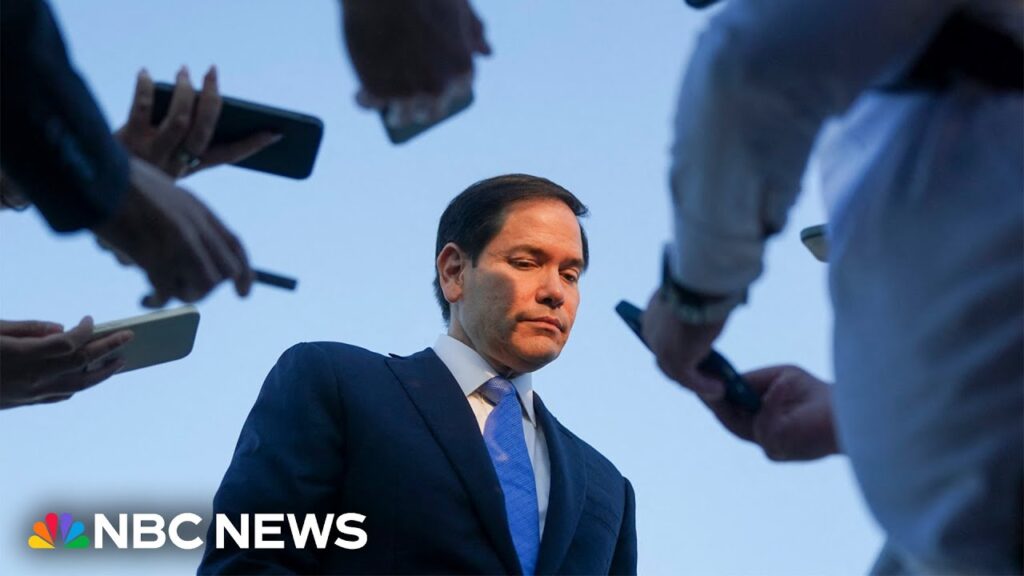In a recent briefing before the armed services committee, held behind closed doors, senior U.S. officials addressed mounting questions about the administration’s posture toward Venezuela. With media reports swirling of a potential U.S. military escalation and regime‐change drive, the session took on heightened significance. One key moment: Marco Rubio — currently serving as Secretary of State — explicitly denied any official U.S. plan aimed at regime change in Venezuela. Instead, he reaffirmed the publicly stated objective: targeting drug traffickers and narco-networks.
That denial is noteworthy. The U.S. has recently deployed naval and military assets near Venezuela’s coast, and lawmakers of both parties have expressed concern that the mission could expand from maritime interdictions to land strikes. For example, according to one congressional source, during a briefing on the matter the lawmaker said they were assured the Pentagon was not planning operations inside Venezuela. The Washington Post+2WCVB+2
Despite Rubio’s denial, critics persist in questioning both the intention and the transparency of the administration’s approach. Some lawmakers argue that pressing such a denial does not resolve deeper issues around the legal justification for operations and the end-state being pursued. For instance, the administration is reportedly using the justification of counter-narcotics operations — and attempting to treat traffickers as “unlawful combatants” — to frame military activity in the region. WCVB+1
From the perspective of key Democrats on the committee, the briefing left important questions unanswered. While Rubio emphasized that no regime-change strategy is underway, some lawmakers say they still lack clarity on how operations are being defined, what limits apply, and what congressional oversight will look like. One Democrat voiced a “major trust deficit” with the Pentagon in the wake of the briefing. The Washington Post
In the video you’re about to watch (link above), you will hear excerpts from the briefing, reactions from committee members, and analysis on what this means for U.S. policy toward Venezuela. We’ll examine:
- What Rubio said — and exactly how he phrased the denial of regime change.
- What Senators and Representatives on the Armed Services Committee asked and what they did not get from the briefing.
- The broader context: why the U.S. is so engaged with Venezuela, what operations are underway (especially maritime and regional), and how the line between anti-narcotics and regime-pressure may be blurring.
- The legal and strategic implications: how the administration justifies military action, how it defines “narco-terrorist” actors, and what risks lie ahead if escalation occurs.
- What this means for U.S.-Latin America relations, for Venezuela’s government and for the regional security environment.

Let’s begin.
(SECTION 1)
Rubio began the briefing by stating, in clear terms, that “we are not pursuing regime change in Venezuela.” He reiterated that the mission is to disrupt drug trafficking, protect U.S. national security, and support regional stability. This denial appears crafted to address leaks and media speculation that the U.S. is preparing a full military operation to remove Nicolás Maduro from power.
(SECTION 2)
However, during the question and answer portion, several Democrats challenged the rationale. They asked: What constitutes a permissible target? What are the rules of engagement? How many troops, if any, might be deployed? Are we still in the maritime interdiction phase, or is the land phase next? According to press reports, one lawmaker said they were told no operations were planned inside Venezuela — but the language left open the possibility of land operations in border zones or adjacent countries. Axios+1
(SECTION 3)
The broader context: the U.S. has increased military assets in the Caribbean and off the coast of Venezuela. It has conducted boat‐strikes against vessels allegedly carrying drugs, and it is intensifying intelligence sharing and regional partnerships. But analysts point out that Venezuela’s actual role in supplying fentanyl or major illicit shipments into the U.S. is limited — raising questions about how the operations are framed and justified. WCVB+1
That creates a tension. If the stated goal is drug interdiction, why build up such a large naval presence, why talk about targets inside Venezuela or Colombia, and why is Rubio’s denial of regime change necessary at all if the goal is only to go after traffickers? Some critics argue the denial is a rhetorical shield hiding escalation. Drop Site News+1
(SECTION 4)
Legal and strategic implications: The administration has reportedly invoked interests of counternarcotics and collective self-defence to argue for military action — including operations in international waters against vessels allegedly linked to Venezuelan networks. Critics say these operations may stretch U.S. war-powers and international law. In the briefing, some members sought assurances that innocent lives wouldn’t be at risk, that transparent legal justification exists, and that Congress retains oversight. According to one source, the briefing did not fully satisfy those concerns. WCVB
In strategic terms, if the U.S. begins referring to the Venezuelan government or its security forces as narco-terrorist actors or de facto adversaries, escalation could follow. The denial of regime change might be quickly rendered moot if operations expand or if direct action is taken toward governing elites. Some commentators warn that once a military build-up begins, mission creep is hard to contain.
(SECTION 5)
For U.S.-Latin America relations, this moment is critical. Regional partners — including Colombia and Mexico — are watching closely. If the U.S. appears to be using anti-drug operations as a pretext for regime pressure, it could undermine trust in diplomatic ties and cooperation. For Venezuela, the government has already accused the U.S. of seeking to topple Maduro. The denial by Rubio may ease some rhetoric temporarily, but suspicion remains high.
In conclusion: Rubio’s explicit denial of regime change signals a delicate balancing act. The administration is attempting to maintain the narrative of counternarcotics while simultaneously preparing for deeper involvement in the region. Congress, for its part, is asking tough questions and demanding clarity. The key question now is: will the assurances hold, or is this the calm before a more expansive operation?
If you’d like, I can provide a transcript of the key exchanges from the briefing, plus analysis of implications for 2026 and beyond. Stay tuned.


